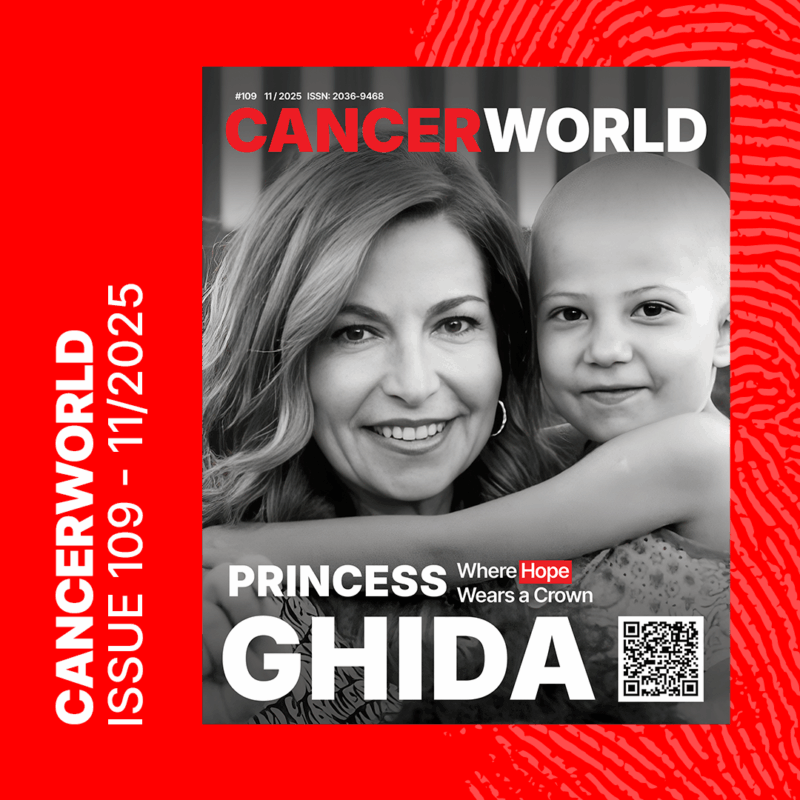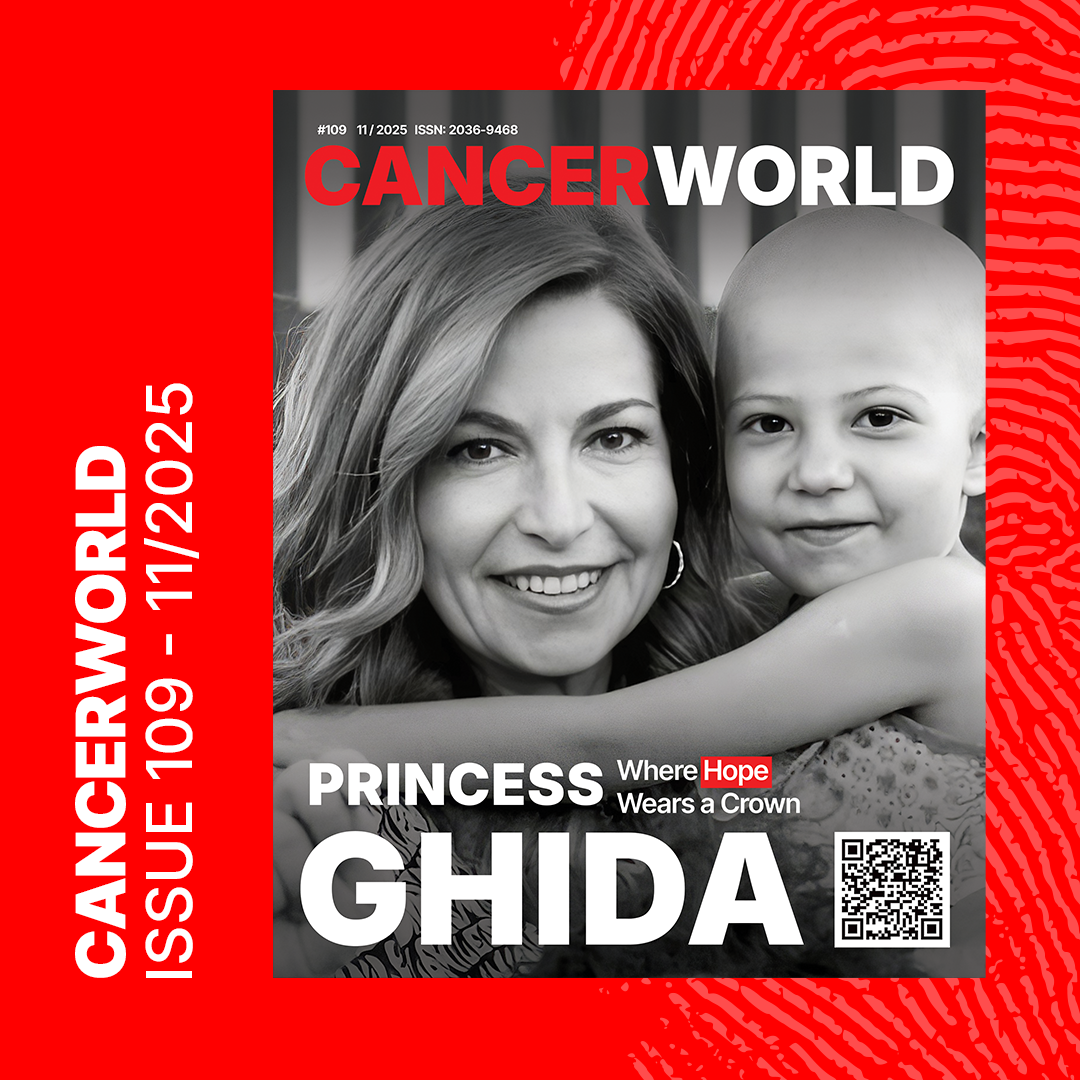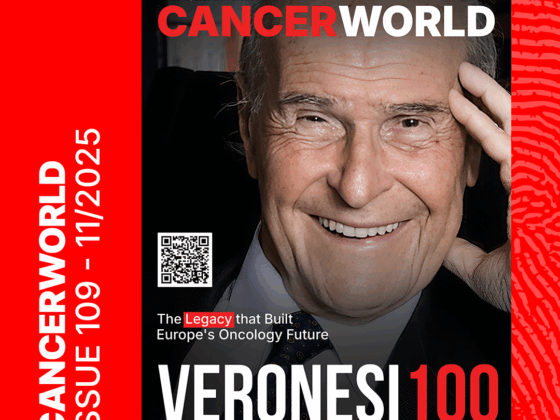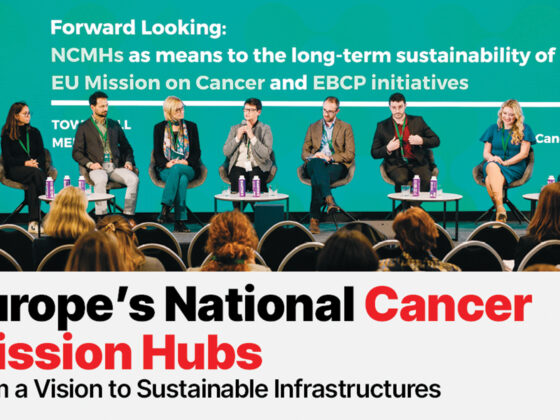Her Royal Highness Princess Ghida Talal of Jordan is widely recognized as one of the Arab world’s leading voices in the fight for equitable cancer care and health justice.
Born in Lebanon and shaped by the resilience forged during her nation’s civil war years, Princess Ghida’s early experiences instilled in her a deep sense of purpose and empathy. After earning a degree in international politics and economics with distinction from Georgetown University, she began a distinguished career in journalism, reporting for Reuters, ABC News, and the Financial Times from some of the world’s most turbulent regions, before being appointed Press Secretary to the late King Hussein of Jordan.
Her life took a profound turn when her husband, Prince Talal bin Muhammad, was diagnosed with cancer, a personal battle that became the catalyst for her lifelong mission to transform cancer care across Jordan and the Arab world. Under her leadership, King Hussein Cancer Foundation and Center (KHCF and KHCC) have treated tens of thousands of patients, forged pioneering partnerships with leading global institutions, and championed a powerful principle: that access to treatment is not a privilege but a human right.
Today, Princess Ghida continues to inspire with her dedication, humanity, and unwavering belief that compassion, science, and solidarity together can change the course of cancer for generations to come.
You grew up during the Lebanese civil war in a politically prominent family. How did those early experiences shape your sense of responsibility and resilience?
When you grow up as a teenager in a war-torn country, you have no choice but to confront realities you never imagined: why people go to war, why lives are taken so senselessly. Those years taught me self-reliance and thrust me into the world of adults far too soon.
I also come from a family deeply immersed in public life where politics and philanthropy were part of daily conversation. From them, I learned to place a high value on knowledge, dedication, and public service. There was always so much politics around our house that I assumed it was part of every child’s upbringing. With politics, you learn early about victories and defeats, and from each, you draw lessons that give you the strength and perspective to face life.
At Georgetown University, you studied international politics and economics with distinction. Looking back, how did your academic path prepare you for the role you eventually embraced in global health and cancer advocacy?
Georgetown was the ideal university for me. It offered a well-rounded yet specialized education. Coming from the Arab world, I was naturally drawn to politics and wanted to understand the forces that were tearing my region and specifically, my country, Lebanon, apart. But in truth, what you study is only part of what shapes you. What matters even more are the habits you form, the discipline of the mind and the friendships you make.
At Georgetown, politics was taught from a truly global perspective. The School of Foreign Service, where I studied, was the first of its kind in the United States and in the world. Another great strength of Georgetown is its diversity. You study alongside classmates from every corner of the world, and you learn from their experiences just as they learn from yours. That global outlook shaped how I approached my work later, and it is, in many ways, the essence of Georgetown.
Journalism was your first career — from ABC News to Reuters and the Financial Times. What lessons did those years in the field teach you about truth, communication, and leadership?
I was drawn to journalism because I wanted to challenge the untruths and biases that so often appeared in the media about my part of the world. In journalism, truth must remain sacred. Once you compromise it, you lose your credibility and your integrity.
I learned to follow stories wherever they took me, even in the most difficult circumstances. I covered Beirut for Reuters during the height of the car bombings between rival factions in 1988, then moved to the other side of the globe – to South America – to work with the Sunday Times of London. While based in Argentina, I covered rebellions within army barracks in Buenos Aires and travelled to Paraguay to report on the military coup that toppled South America’s longest-ruling dictator, Alfredo Stroessner.
In 1991, King Hussein asked you to establish the International Press Office and serve as his Press Secretary. What were the most memorable and challenging moments of working so closely with the late King?
It was the greatest privilege of my life to work with King Hussein. He was humanity and humility personified, a man who led with compassion and treated everyone with respect.
What moved me most was how deeply he cared for his people. The Hashemite family has always been close to the Jordanian people, listening to their concerns and standing by them in times of need. King Hussein carried that sense of responsibility in his heart every day, just as King Abdullah continues to do today. Working by his side was an unforgettable education in leadership, humility, and humanity.
Your life took a profound turn when your husband, Prince Talal, was diagnosed with lymphoma at such a young age. How did that personal battle with cancer redefine your priorities?
Overnight, our lives were turned upside down when my husband was diagnosed with cancer. Life as we knew it changed completely. Suddenly, nothing else mattered — not plans, not routines, not ambitions. All that mattered was his battle for life.
Priorities shifted instantly, and everything that once seemed important faded into the background. You find yourself living in a different rhythm, almost in a bubble, where the world keeps moving but your focus narrows to the only real priority: helping the person you love survive.
You once said that being by the side of cancer patients has given meaning to your life. Could you share the moment when you realized this was your true mission?
Our battle with cancer changed everything for me. It gave me a deep sense of purpose as I was desperate to make sure that patients and their families facing cancer in our region had the same chance at life that we had.
I remember sitting in the hospital while my husband was undergoing treatment and thinking about all the women in our part of the world who didn’t have that privilege. I thought of their fear, their helplessness and their pain. That was the moment I knew I had to help change this reality and ensure that hope and survival were possible for everyone, not just for the few who could afford it.
When you took on leadership of KHCF and KHCC in 2001, the cancer landscape in the Middle East was extremely bleak. What were the biggest obstacles you faced at the beginning?
When I established KHCF and KHCC, the cancer landscape in Jordan and in our region was bleak. There was almost nothing — no proper facilities and no place for patients to turn to, no specialized oncologists and healthcare professionals, nothing.
One of the biggest challenges was reversing the medical brain drain. In the beginning, we reached out to talented Jordanian and Arab doctors who had found success abroad and asked them to return to Jordan. With their belief in our mission and direct participation in our efforts, we were able to quickly build a highly qualified and highly specialized medical team.
The other challenge was the stigma. Before our Center was established, cancer had been equated with death to the extent that people were afraid even to say the word. After 25 years of awareness and education, I can say with pride that we have made a real dent in that taboo. Today, people speak openly about cancer and fight their cancer with patience and optimism.
Today, KHCC is regarded as one of the most advanced cancer institutions in the region, with strong international partnerships. What do you consider its proudest achievements under your leadership?
Our proudest achievement is that we have treated more than 70,000 patients with the most advanced care, giving tens of thousands of people a real chance at life. We have built KHCC into a true center of excellence, offering advanced treatments such as immunotherapy, bone marrow transplants, CAR T-cell therapy, robotic surgery, and other groundbreaking procedures that were once only available abroad.
But what makes me most proud is that we never turn anyone away. Whether it is a refugee or someone with no means to pay, every person is treated with the same care and dignity. This commitment to humanity is what led us to establish the Goodwill Funds – special funds dedicated to supporting underprivileged patients who could not otherwise afford treatment. Through these funds, the Center has been able to cover the costs of care for thousands of patients, ensuring that no one is ever denied treatment because of financial hardship.
The harmony between medical excellence and compassion, and humanity is what truly defines KHCC.
How have collaborations with institutions like MD Anderson, St. Jude, and the NCI helped KHCC transform into a global leader in cancer care?
Our international medical partnerships have been central to KHCC’s success and are a true mark of credibility. Our very first partner was St. Jude Children’s Research Hospital, and that collaboration set the tone for everything that followed. We went on to learn from and work with the best cancer centers in the world, including MD Anderson Cancer Center and the National Cancer Institute. These partnerships helped us raise our standards, strengthen our expertise, and position KHCC as a global leader in cancer care. We continue to seek new collaborations that serve our mission and help us deliver the most advanced treatment to our patients.
Philanthropy and fundraising are central to sustaining KHCF/KHCC. What has been your most inspiring experience in mobilizing support for cancer patients in Jordan and beyond?
What has inspired me most is seeing an entire community come together in the fight against cancer. From the very beginning, we wanted this to be more than just an institutional effort, we wanted it to be a national, collective movement.
Over the years, we have seen people from all walks of life contribute – children donating their pocket money, families sponsoring patients, companies and philanthropists standing by our side. It is a reminder that just as cancer is not bound by borders, neither is compassion.
Across the Middle East, stigma around cancer remains a barrier. How have you worked to break that stigma and change public perception?
One of the most powerful ways to break stigma is through example, by showing that survival and life after cancer are possible. At KHCC, the quality of care and the stories of our survivors have changed how people see cancer. KHCC’s survival rates are commensurate with Western standards.
We have also worked to engage every part of society: for example, our breast cancer awareness efforts are targeted toward women and men. We have seen firsthand that when an entire community stands together, the fear and shame surrounding cancer begin to fade, and hope takes their place.
Delivering cancer care in countries affected by conflict — whether Iraq, Syria, or Gaza — is uniquely challenging. What role do you believe institutions like KHCC can play in supporting patients from war-torn regions?
From the start, we’ve considered it our duty to care for every cancer patient who needs our help, no matter where they come from. We have treated patients from Iraq, Syria, Palestine, and beyond, and after the Beirut blast, we sent much needed cancer medications to 8 hospitals across Lebanon. In times of crisis, KHCC is always ready to help and support cancer patients everywhere.
What have you learned about the intersection of politics, conflict, and health while advocating for cancer care in the Arab world?
In many parts of the world, cancer is often placed at the bottom of the list of national priorities, even though it is just as lethal as any other crisis. Yet, there is no more urgent or universal cause than cancer. It touches every family, every community, and every country.
I have made it my mission to keep cancer at the forefront and to remind policymakers and the public that saving lives from cancer is not a luxury that should only be addressed after our more “pressing” challenges. It is an urgent moral obligation.
You represented Jordan at the UN General Assembly meeting on non-communicable diseases. How do you see cancer fitting into the broader global health agenda?
Even as the world faces one crisis after another, we cannot afford to lose focus on cancer. It’s a silent epidemic that continues to take countless lives. Cancer must stay at the top of the global health agenda as it is not only a medical challenge, but also a humanitarian one.
As a woman leader from the Middle East at the forefront of health advocacy, what barriers have you encountered, and what message do you share with young women aspiring to leadership?
It is a given that all women experience sexism at some point in their lives. But at KHCF and KHCC, many of our most important leadership positions are held by women, which makes me deeply proud. My message to young women is this: believe in your voice, trust your strength, and never let anyone convince you that there is anything you cannot achieve.
The Iraq Scholar Rescue Project is one of your lesser-known but remarkable contributions. How did it feel to help scholars at risk rebuild their lives and careers?
Supporting the scholars and academics of our region was an absolute imperative. Through the Iraq Scholar Rescue Project, we wanted to give them safety, dignity, and the chance to rebuild their futures, and, most importantly, to keep their talent rooted here at home, in the Arab world. Helping them start again was deeply moving, because in protecting them, we were also safeguarding the region’s intellectual future.
Cancer care is advancing rapidly with immunotherapy, AI, and precision medicine. How do you envision KHCC positioning itself in this new era of innovation?
We are proud that KHCC has always led our region in adopting the latest innovations in cancer care, even within relatively limited resources. Immunotherapy and precision medicine have been part of our treatment protocols for years, giving our patients access to the most advanced and personalized care available. Our goal is always to harness innovation to improve outcomes and enhance efficiency.
Most recently, we established our Artificial Intelligence and Data Innovation Office to ensure that new technologies, especially AI, are fully integrated into our clinical and research work.
If you could secure one major policy change across the Arab region to transform cancer outcomes, what would it be?
If I could push for one major policy change, it would be real investment in cancer research across the Arab world. We have the talent and the resources, but we need enhanced collaboration to be at the forefront of global discovery.
And, just as importantly, we must finally take a firm stand against tobacco. With some of the highest smoking rates in the world, we need not only laws but enforcement that treat tobacco as the true enemy of our people’s health.
Another major priority that is very close to my heart — and one that should be at the top of Arab policy agendas — is mental health. At KHCC, we have established a comprehensive psycho-social department dedicated to supporting all our cancer patients from the very moment they are diagnosed. We recognize how deeply they need emotional and psychological care alongside their medical treatment. Sadly, millions around the world still suffer in silence — and that is neither right nor fair. We must remember that there is no health without mental health.
Balancing your roles as a mother, a leader, and a global advocate cannot have been easy. What has kept you grounded through the years?
Every time I walk into KHCC, I’m reminded of why I do what I do. When you are by the side of cancer patients – seeing their courage, their hope, and their faith – it grounds you instantly. It reminds you that this work is about people, about life itself.
Finally, who should I interview next?
I strongly recommend that you interview Dr. Hagop Kantarjian, Professor and Chair of the Department of Leukemia at the MD Anderson Cancer Center. Often referred to as the “King of Leukemia,” Dr. Kantarjian is one of the most accomplished and respected oncologists in the world, with one of the highest publication records in his field. Born in Lebanon, he has combined brilliance in science with deep humanity and humility. Despite his extraordinary achievements, he remains remarkably grounded — a true giant in medicine and a role model for generations of physicians and scientists around the globe.












